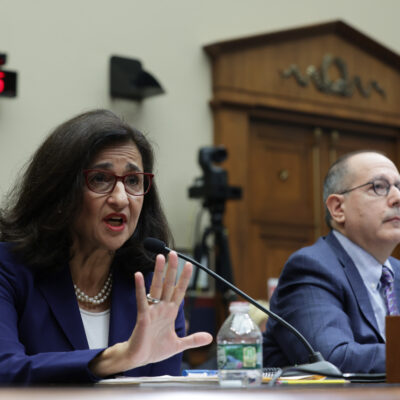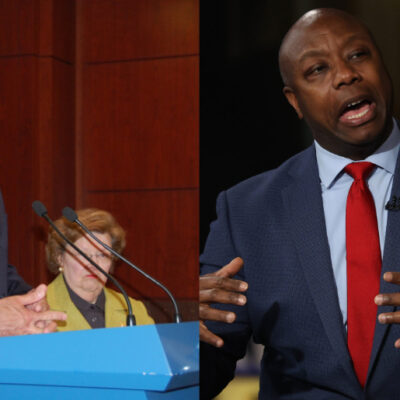Rep. Tlaib: My ancestors ‘had been wiped out… in the name of trying to create a safe haven for Jews’
The Michigan lawmaker appeared on the Skullduggery podcast

AP
Rep. Rashida Tlaib.
Representative Rashida Tlaib (D-MI) pushed for a one-state solution to the Israeli-Palestinian conflict, on the Yahoo News Skullduggery podcast Friday, with Michael Isikoff and Dan Klaidman. She offered her view that, “in the name of trying to create a safe haven for Jews,” Palestinians “lost their land and some lost their lives, their livelihood, their human dignity, their existence in many ways had been wiped out.”
Below is a transcript of the conversation lightly edited for clarity.
Michael Isikoff: You’re the first Palestinian-American woman to serve in Congress and you are organizing a trip to the West Bank during the summer recess, I believe. First of all, how many members do you have who have agreed to go and what do you want to show them? I think you’re grandmother lives in the West Bank…
Rashida Tlaib: Yeah, Humpty Dumpty Institute is organizing the trip. I am going to be on the trip. I am eager to be part of the trip and being able to engage Palestinians, what I call community members without titles. I’m hoping that we engage also, Israelis, again, not government officials, not appointees, but actual people that live day to day with increasing inequality.
Dan Klaidman: You wouldn’t meet with any Israeli government officials or members of parliament, the Knesset?
RT: Palestinian or Israeli, I think we want to actually look at the human impact. When I think about a town hall, you know, you don’t get elected officials — you want to talk to the people. That’s what I’m hoping this trip is a massive town hall where we talk to a woman that is working in integration of schools. I want to talk to the other organization that literally is about entrepreneurship but between Israelis and Palestinians.
I grew up in a city that is the most beautiful, blackest city in the country, the city of Detroit and every corner is a reminder of the civil rights movement. I saw what oppression and equality looks like, I saw that separate but equal doesn’t work. And so for me, I want my colleagues to see a side that they can relate to, that they can see that this is not about choosing sides, but choosing values, if you start with that, then you might actually be able to look at this in a lens that is really, truly fair.
DK: So congresswoman, you’ve created something of a stir by coming out in favor of a one-state solution, Israel and Palestine, and I think you may be the only Democrat who’s publicly supported a one-state solution, what is your vision for a one-state solution that meets both Palestinian and Israeli-Jewish national aspirations.
RT: Absolutely. Let me tell you, I mean, for me, just two weeks ago or so, we celebrated, but just took a moment I think in our country to remember the Holocaust. There’s kind of a calming feeling, I always tell folks, when I think of the Holocaust and the tragedy of the Holocaust and the fact that it was my ancestors, Palestinians who lost their land and some lost their lives, their livelihood, their human dignity, their existence in some ways had been wiped out.. all of it was in the name of trying to create a safe haven for Jews, post the Holocaust, post the tragedy and horrific persecution of Jews across the world at that time. And, I love the fact that it was my ancestors that provided that, right? In many ways. But they did it in a way that took their human dignity away, right? And it was forced on them. And so, when I think about a one-state, I think about the fact, why can’t we do it in a better way where — and I don’t want people to do it in the name of Judaism, just like I don’t want people to use Islam in that way — it has to be done in the way of values around equality and around the fact that you shouldn’t oppress others so that you can feel free and safe. Why can’t we all be free and safe together?
DK: But a one-state solution, with the right of return, just the math suggests that Jews would become a minority in that state…
RT: But Dan, it’s not up to us to decide what it looks like. Just like, when I have my African-American teachers taught me about neighborhoods they couldn’t live in, taught me about places they couldn’t work, but it’s important to understand that separate but equal didn’t work here, right, and then we have to allow the self-determination to happen there, but for me that’s the lens I bring to it, but I’m not a leader there.
DK: But isn’t it giving up, to say we’re just going to — the idea of two-state solution with two independent states that are sovereign and independent and free, aren’t you giving that up, that dream?
RT: But I didn’t give it up, I didn’t give it up. Netanyahu and his party gave it up and the Israeli government gave it up.
DK: It’s not worth fighting for anymore?
RT: It’s not for me to decide, it’s the will of the people. If Netanyahu got up tomorrow morning and decides, you know what I’m going to take down the walls. I’m not going to expand the settlements, enough is enough, I really want to push toward a two-state solution. He has every power, every power to do that. And then people might, like myself and others will truly believe in that. But uprooting people all over again, to say that that’s going to — because do you understand, when you look at the landscape, just map it out, it is almost, absolutely impossible with how he has proceeded to divide, how he’s proceeded to dissect and segregate communities — that is impossible for me to see a two-state solution without more people being hurt.
MI: The Palestinian Authority itself still, at least rhetorically, supports a two-state solution. Hamas does not. How do you distinguish your position from Hamas?
RT: Well, I don’t come from a place of violence, I come from a place of love and equality and justice. You know for many of these organizations, it’s about power struggle. But that’s why it’s important in this trip that we talk to real people that are living it every day. Not the people in power that obviously want to continue to fight and they may feel in their own right that it’s justified. And you hear them and you can see the sincerity from those that have supported the kind of approach that Netanyahu’s taken towards Palestinians and vice versa. I can hear this type of tension — the thing is I’m one person that grew up in a black community, that saw what inequality and oppression looks like. To me, that’s how I was raised. And now I’m a Palestinian-American congress member and you’re telling me to wipe that out and change it, and look at it from a different lens, and how can I do that? How can I say to my grandmother in her face, that she doesn’t deserve human dignity, that she is less than, because she’s not of Jewish faith. She was born a different ethnictity, a different faith, whatever it is that people want to label her as, and I keep saying to people, how is that not wrong? How is that we’re not saying to ourselves, when are we going to create a place that is Fsafe for everybody in the State of Israel and the Palestinian Occupied Territories. I just really think it’s important for people to understand that I can’t dissect, or completely take that lens off when I look at the two lines and the different color license plates and the fact that Palestinians can’t get on the same bus as Israelis, it’s ridiculous.
DK: There are extremists on both sides, who also are in favor of a one-state solution, which would be expelling the Arabs or expelling the Jews, so aren’t you playing with fire by supporting a one-state solution?
RT: No, I’m coming from a place of love for equality and justice, I truly am. I want a safe haven of Jews. Who doesn’t want to be safe? I’m humbled by the fact that it was ancestors that had to suffer for that to happen. But I will not turn my back and allow others to hijack and say it’s an extremist approach — because they’re coming from a place of whatever it is, division, inequality. But you know, if you look at Netanyahu, he is the first person to come out and support President Trump’s wall. That is not the kind of leadership — when I look at people pushing back and saying ‘What about this?’ and I said, until I actually see people moving towards, moving towards desegregating, moving towards those kind of type of oppression and making people feel less than, then maybe they would have some sort of credibility with somebody like myself, that grew up in Detroit where we can smell it from far away that, no, you don’t want to look at my grandmother in the eye, Netanyahu, and say, you are equal to me, you are as human as I am to you and yes you deserve to die with human dignity.








